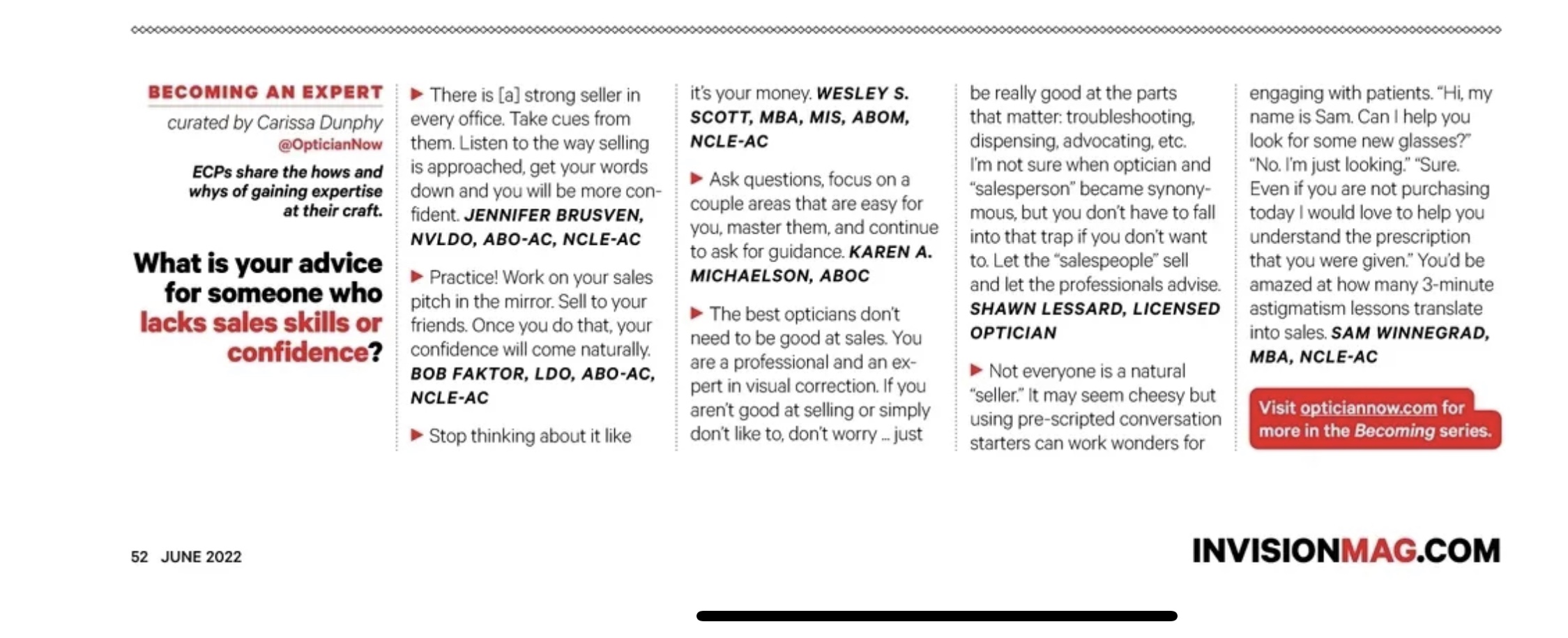 What is your advice for someone working their way to become an Optician?
What is your advice for someone working their way to become an Optician?
Work in the field while going through the school or career progression to help bring meaning to what you’re learning. Or if you aren’t in a licensed state or situation, pick up some books or video groups to help you bring a better understanding of what you’re learning. Exams are not just questions for fun, they all have a purpose.
Why should anyone get certified/licensed?
I believe in educating yourself and growing yourself, and then putting that education to a test. It helps bring credibility to your work with patients/customers, and hopefully gives you self confidence in your abilities. It shows you’re willing to go the extra mile to your employer as well.
In your experience, what is the best way to prepare for an Opticianry test?
Reading the materials out there and also working in the industry and finding a mentor to help. There have been some outdated study materials for a long time, but now there are better ones that are worth investing in. Ask questions when you don’t understand. Everyone has been an early student in this field at one time or another.
What do you remember as being a prominent part of the test or that you were surprised to see on the test?
Many people feel that understanding prism, and prismatic imbalances is not needed or as important as the testing or study guides make it. I can tell you once you understand this concept, you are better at troubleshooting issues and of course, taking proper measurements.
How do you decide if an additional credential should be earned?
My state requires all 6 ABO and NCLE certifications in order to be licensed, so my perception of the testing needs is different from most states. If talking about personal growth in the field, then I say as soon as you have completed one basic exam, and most states it’s 3 years waiting to test for the advanced, I’m of the opinion you start preparing for the next exam a month after you’ve completed the last one. Start understanding what’s required on the next exam and if it’s 3 years wait, then work over time on each concept, so you’re properly applying the knowledge, not just cramming information into your head at the last minute just to pass a test.
What was the point when you decided to attain your license/certification?
Again, Nevada requires licensing in corporate settings, so it was an understanding at the point of hire. I’d say if you don’t have a requirement where you are at, or work in private practice under an OD’s license, take 6 months to a year and get the industry basics down, and then consider pursuing a study program or exam prep.

What do you feel is your strongest skill as an Optician?
I fit specialty contact lenses, mainly sclerals, I work in a low vision practice, and also oversee our Color Vision Deficiencies testing and Enchroma glasses. I work with some very complex cases daily and I love a challenge to help people see better. I listen carefully to what patients say and work their vision needs into their requests, while still taking optics into consideration. I don’t feel I have one strong skill, I just work all my unique optical passions together and make myself valued in several areas.
What role have you held that best helped you to be the Optician you are today?
Ophthalmic Dispensing Student and Licensed Apprentice. Both roles together gave me a better understanding of being a good optician
What is your advice to someone who lacks sales skills or confidence?
There is almost always one strong seller in every office. Take cues from them. Study and read product information. Listen to the way selling is approached and once you get your words down you will be more confident. Learn what different add-ons to lenses mean and where they are best applied.
If you are no longer an Optician in the traditional sense on a daily basis, how did your Optician skills help you with what you’re doing now?
As I step more and more into contact lenses and do less in spectacles, I still use the lens design concepts and optical theories every day. I still discuss features and benefits.
If you have a state where you have an association, GET INVOLVED. Meet other opticians and industry professionals and leaders and mentors. Grow your network. Stay away from negative situations and negative people. This is still a service industry. We are here to help people see better. It’s a beautiful gift and opportunity that should not be treated negatively.
Responses in this interview provided by Jennifer Brusven, NVLDO, ABO-AC, NCLE-AC
Find Jennifer online here:
LinkedIn

 What is your advice for someone working their way to become an Optician?
What is your advice for someone working their way to become an Optician?